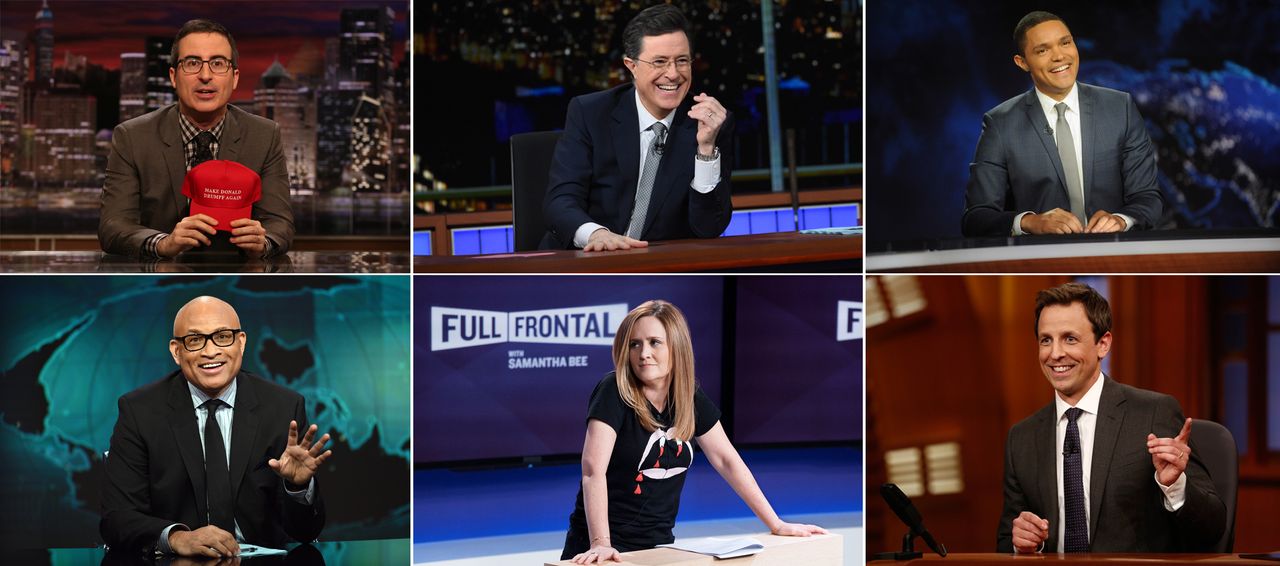Late-night political comedy is actually better than ever
Jon Stewart may be gone from your TV set, but his heirs and protégés are doing just fine


The 2016 presidential race has been long and crazy and full of twists and turns, and amid all the angst and elation and disappointments and Donald Trump, it's hard not to ask: Where the hell is Jon Stewart?
Plenty of critics are asking. And it's true that Stewart would have shone in this moment of political insanity. When he took over The Daily Show in 1999 from Craig Kilborn, during a particularly noxious period in American politics, Stewart took those lemons and made one helluva pitcher of lemonade. Over 15 years, he turned his platform into an essential part of America's political-cable industrial complex — no small feat for a basic-cable comedy show — and then exited stage left at the pinnacle of his career.
But nobody needs to mourn his departure from TV. Late-night comedy is covering the 2016 race just fine without him, and in some cases, his heirs and protégés have upstaged him. Many of them learned from him, but they aren't trying to replace him, as my colleague Pascal-Emmanuel Gobry suggests. Nobody can.
Subscribe to The Week
Escape your echo chamber. Get the facts behind the news, plus analysis from multiple perspectives.

Sign up for The Week's Free Newsletters
From our morning news briefing to a weekly Good News Newsletter, get the best of The Week delivered directly to your inbox.
From our morning news briefing to a weekly Good News Newsletter, get the best of The Week delivered directly to your inbox.
Let's look at the current class of late-night comedy pundits. There's Trevor Noah at The Daily Show, Larry Wilmore at The Nightly Show, Stephen Colbert at The Late Show, Samantha Bee at Full Frontal, John Oliver at Last Week Tonight, and Seth Meyers at Late Night. All but Meyers worked with Stewart, but Meyers' brand of political satire — his "Closer Look" segments, mostly — traces its pedigree back 25 years before Stewart stepped onto the Daily Show set.
In 1975, Chevy Chase launched "Weekend Update" on Saturday Night Live — a "fake news" anchor chair Meyers occupied from 2006 until he took over Late Night in 2013. Like Stewart, Chase and his successors sat behind fake news desks and told real jokes about real news. It makes as much sense to say that Meyers is imitating Stewart as to argue that Stewart was trying to be the next Chevy Chase.
Each of the men and woman covering the comedy-news beat has strengths and weaknesses. They are not all funny all the time, though Stewart would be the first to tell you he had off-nights, too. Meyers has a good team of writers, and while his delivery isn't always perfect, his closer looks at current events always have a handful of great jokes. He also asks good questions when candidates go on his show.
Colbert makes most of his political jokes in his monologue — just like Johnny Carson, Jay Leno, David Letterman, and Jimmy Fallon — but he also has brought in some truly new ways of covering the long 2016 race. Some of his bits don't quite work, but he weeds them out, and his Hunger Games-inspired sendoffs for vanquished primary candidates and his chats with Cartoon Donald Trump, for example, are often delightful. Colbert is studiously respectful when he interviews candidates and political figures, but he generally knows when to push back with follow-up queries.
Bee's comedy is sharp (if overly reliant on profanity), and she has ably carried on the great Daily Show tradition of interview segments that shine a spotlight on little-covered news. Noah is finding his footing in the giant shoes he stepped into, but he's funny and his correspondents are a huge asset. Wilmore unapologetically and wryly offers a black perspective on the news, and even if his jokes don't always land, they reliably illuminate. Like John Oliver, a native of Great Britain, these last three offer a refreshing perspective on U.S. news that Stewart, from New Jersey, did not (Bee is from Canada, Noah from South Africa).
Still, Oliver is in a class of his own. What he's doing at HBO is something Stewart never had the time or budget to attempt, and his improbably entertaining 20-minute segments on net neutrality, scientific studies, campaign finance, fantasy sports sites, and yes, Donald Trump are informative and, in some cases, influence the public debate. Oliver isn't doing what Jon Stewart did — he's doing what John Oliver does, and in many cases, it's better than what Stewart did. He's like 60 Minutes for the younger set, or for anyone who likes to laugh and learn, mixing comedy and advocacy journalism.
And that's the crux of why late-night comedy news is in good shape in the post-Jon Stewart world. Instead of one man (and his team) doing a half-hour show four nights a week, there's usually at least one comedian sitting behind a desk, riffing on the news, every night of the week — and always online. Sometimes they cover the same news, but because there are so many of them, Bee can also touch on Native American tribal sovereignty at the Supreme Court, or Meyers can spend a few minutes looking at Colorado's plan to enact single-payer health care.
Comedians can illuminate parts of a news story that "real news" anchors can't. And like medicine, hard news can sometimes go down easier with a spoonful of sugar, which is just fine — do politics, commerce, and social issues always have to be dreary to learn about? Satire is no substitute for straight news, like commentary isn't a stand-in for journalism, or frosting is no replacement for cake.
The year since Jon Stewart signed off The Daily Show has been, if anything, more crazy and baffling and ugly than America has seen in decades. Satire can act as a sort of pressure relief valve. America needs more laughter now, not less, and America's late-night comedians are doing a good job providing it. For various reasons, they skew left politically. But if the Democrats keep the White House in November, conservatives might want to consider the possibility that Democrats won because they get their political entertainment from professional comedians, not politicians.
Sign up for Today's Best Articles in your inbox
A free daily email with the biggest news stories of the day – and the best features from TheWeek.com
Peter has worked as a news and culture writer and editor at The Week since the site's launch in 2008. He covers politics, world affairs, religion and cultural currents. His journalism career began as a copy editor at a financial newswire and has included editorial positions at The New York Times Magazine, Facts on File, and Oregon State University.
-
 The decline of the contraceptive pill
The decline of the contraceptive pillIn the Spotlight Fears of the pill's side effects, stoked by social media, behind switch to fertility trackers – or no contraception at all
By Harriet Marsden, The Week UK Published
-
 Explorations Company: a Kenya safari adventure beyond the expected
Explorations Company: a Kenya safari adventure beyond the expectedThe Week Recommends Experience Kenya's wild beauty on a safari that combines close wildlife encounters with conservation and community initiatives
By Sorcha Bradley, The Week UK Published
-
 Why has Tulip Siddiq resigned?
Why has Tulip Siddiq resigned?In Depth Economic secretary to the Treasury named in anti-corruption investigations in Bangladesh
By Sorcha Bradley, The Week UK Published